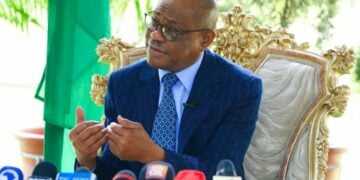On Thursday in Abuja, while most of the city was preoccupied with traffic, I sat in a hall full of suits and buzzwords for the Innovate Africa Conference 2025. The theme—“Metamorphosis of Power: Reimagining Leadership Competencies for Africa’s Investment Future.”
It sounded lofty. And for once, the speeches matched the gravity of the moment. Mazi Sam Ohuabunwa, a man who has seen both the boardroom and the backroom of politics, didn’t bother with diplomatic niceties. He said Africa’s problem is not poverty or lack of natural resources but corrupt power structures that reward manipulation, greed, and mediocrity over competence and integrity. He’s right.
Every African sitting in that hall knew he was right, but the problem with truth in Africa is that it’s like electricity—everyone claims to have it, yet we stay in darkness.
Ohuabunwa spoke of “power metamorphosis.” Fancy term. What he really meant is that we need to tear down the rotten architecture of power we’ve inherited and built upon. Because right now, power in Africa is not a tool for service—it’s a trophy for survival.
Let’s not sugarcoat it. The average African leader doesn’t rise through vision or sacrifice. He claws his way up through godfathers, ethnic deals, and vote-buying. Elections are business ventures, not contests of ideas. Seats are auctioned to the highest bidder, and once in office, loyalty is to the clique that paid the bill, not the people who paid the price.
That’s why 65 years after independence, we’re still debating electricity, clean water, and stable currency. It’s not an infrastructure problem. It’s a leadership problem.
Minister of the FCT Nyesome Wike, put it differently that same day. He called it “transactional leadership.” That phrase hit me harder than most of his usual political fireworks. Because that’s exactly what it is—leadership as a transaction, not a mission. A give-and-take between godfathers and their protégés, where public service is the collateral damage.
He said Africa stands at a crossroads. Maybe. But I think Africa has been standing at that same crossroads since the 1960s, holding the same file, waiting for the same bus that never comes. We keep changing drivers, not the route.
From Ghana to Guinea, from Sudan to South Africa, we’ve mastered the art of recycling mediocrity. Leaders who failed as governors rebrand as elder statesmen. Those who collapsed the economy of one nation become consultants to another. The continent runs a loyalty program for incompetence—serve badly, and you get promoted.
And every election cycle, we pretend shock when the same faces resurface, clutching new slogans about “youth empowerment” and “digital economy.” I’ve covered enough of these conferences to know that the script doesn’t change, only the PowerPoint background.
Ohuabunwa made a point about the “24 core leadership competencies” every public officer should have—education, emotional intelligence, accountability, teamwork, and the ability to translate ideas into measurable results. He’s spot-on. But let’s be honest: how many African politicians would even pass the basic integrity test, let alone 24 metrics?
The truth is, competence doesn’t win elections here; cash does. If you doubt that, check the last ten general elections across the continent. Nigeria, Kenya, Zimbabwe, even South Africa—campaign funding looks more like an arms race than a democratic process.
And once power is seized, it becomes a fortress. You can’t pry it open with logic or ballots. That’s why coups keep finding oxygen. Not because soldiers are saviors, but because civilians in power behave like monarchs. Mali, Niger, Burkina Faso, Gabon—the pattern is the same. Civilian failure creates military temptation.
We keep condemning coups while applauding the conditions that breed them. That’s hypocrisy on a continental scale.
I remember someone at the conference whispering, “Maybe we just need younger leaders.” No. We need better leaders. Age has never been the problem. Half of Africa’s tyrants seized power before 40. Mobutu was 35, Rawlings 31, Taylor 39. Youth without ethics is just immaturity with a microphone.
We keep mistaking generational change for systemic reform. You can’t recruit angels into a system that rewards demons. You’ll only corrupt the angels.
Ohuabunwa called for reforms to reduce money influence, discourage gerontocracy, and promote digitally skilled leaders. Fair enough. But until we criminalise electoral fraud with the same energy we chase street thieves, nothing will change. In some countries, stealing a goat will land you in jail faster than stealing a mandate.
And the tragedy? We normalise it. We debate stolen elections the way football fans argue penalty kicks—animated, emotional, and utterly powerless to change the score.
Let’s talk about the private sector too. Because this disease isn’t confined to politics. The same mediocrity thrives in our corporate world. CEOs appointed for tribal balance, not competence. Boards that reward loyalty over results. Even in development agencies, contracts are divided along friendship lines.
So when Ohuabunwa talks about a “power metamorphosis,” he’s not exaggerating. Africa needs a full reboot—of values, not just systems. Power must stop being a personal inheritance and become a public trust.
But here’s the uncomfortable question: who will lead that metamorphosis? The same class that benefits from the rot? The same civil service that fattens on bureaucracy? The same youth cheering corrupt politicians because they “share something”?
We can’t outsource reform to the guilty. Citizens must demand it. Because no one gives up power voluntarily in Africa; it must be extracted through accountability and public pressure.
Wike gave an example—Abuja’s road renewal. He said when leadership has vision and political will, transformation follows. Fair point.
Africa loves ceremonies more than progress. We commission what we never maintain, reform what we never enforce, and celebrate what we never sustain.
That’s why every administration starts with “renewed hope” and ends with “we met an empty treasury.”
Now, Uloma Onyebuchi, the founder of Innovate Africa, wrapped up the conference with a line that stuck with me: “Africa’s development story must be written by Africans themselves.” She’s right. But to write our story, we must first change the authors.
Right now, our scriptwriters are the same old cabals who see public office as a retirement benefit. Every few years, we try to edit the story with donor funds and imported consultants. But how do you rewrite corruption in British grammar?
Foreign aid won’t save Africa. Conferences won’t either. Until competence becomes electable and integrity becomes profitable, we’ll keep meeting, clapping, and sinking deeper.
Some people say Africa is cursed. I don’t buy that. We’re not cursed—we’re careless. Look at Rwanda’s health reforms, Botswana’s fiscal discipline, and Cape Verde’s stability. They prove governance can work on this continent when leadership decides to act sanely.
But those are exceptions, not the rule. And the rule remains: whoever controls power controls prosperity. Which explains why the biggest investors in African politics are not visionaries—they’re businessmen hedging their bets.
Every election becomes a venture capital round, and the people? They’re minority shareholders with no voting rights.
Let’s face it, the average African youth doesn’t even trust the system anymore. They don’t vote because they believe the game is rigged. And they’re not entirely wrong. The electoral commissions in half the continent’s democracies are more loyal to incumbents than to voters. Until we fix that, all this talk about “investment future” is academic. Investors don’t invest in confusion.
No sane investor puts money where the next election could erase ten years of policy. That’s why capital keeps fleeing to Dubai and Singapore while we’re still debating federal character.
So where do we start? First, we must redefine leadership recruitment. In Africa, you need a sponsor to run for office; in sane societies, you need a résumé. Let’s flip that. Political parties should adopt internal merit tests—academic, ethical, and psychological. Make candidates earn tickets, not buy them.
Second, cut the cost of politics. Cap campaign spending. Publish donations. Every dollar must be traceable. You can’t sanitise elections without following the money.
Third, civic education. Our people vote with sentiment because we’ve left them uninformed. Power metamorphosis begins with voter metamorphosis. Until the average voter understands that competence feeds him more than ethnicity, we’ll keep electing poverty in new wrappers.
And lastly, institutional reform. Strong laws, stronger enforcement. The day a sitting president or governor goes to jail for corruption without ethnic uproar, that’s the day Africa begins to heal.
Some will say I’m being too harsh. Maybe. But sentiment is a luxury we can’t afford anymore. Every time we excuse incompetence, another generation pays for it in unemployment, migration, and despair.
Ohuabunwa was right when he said, “Leadership is not for dullards or bullies.”Sadly, that’s exactly who we keep rewarding.
Power, in Africa, has become a mirror—whoever stares into it too long starts to think he’s divine. Until we smash that mirror and build systems that outlast egos, we’ll keep repeating this endless cycle of disappointment.
We don’t need messiahs. We need mechanisms. Systems that make bad leaders irrelevant and good ones inevitable.
As the conference ended, delegates posed for pictures, exchanged cards, and promised partnerships. Outside, Abuja’s traffic reminded me why the speeches mattered. Because leadership failure isn’t theory—it’s in the blackouts, in the police checkpoints that extort you beforeore sunrise.Africa doesn’t lack ideas. It lacks honest execution.
Until power stops being a personal property and becomes a public trust, we’ll keep holding conferences on transformation while standing still.
And when the next “Innovate Africa” rolls around, we’ll probably be back in the same hall, quoting the same speakers, still waiting for that bus at the crossroads.





